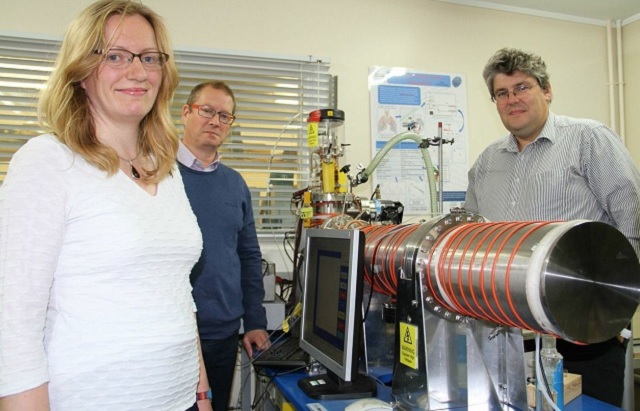 This image depicts from lef to right Dr Martha Clokie, Professor Andy Ellis and Professor Paul Monks from the University of Leicester with the mass spectrometer. Credit: University of Leicester
This image depicts from lef to right Dr Martha Clokie, Professor Andy Ellis and Professor Paul Monks from the University of Leicester with the mass spectrometer. Credit: University of Leicester
Researchers at the University of Leicester have developed an ‘electronic nose’ that can rapidly detect the bug Clostridium difficile (C-diff).
This bacteria is highly infectious and causes stomach cramps, diarrhoea, and temperature. It is a major concern for healthcare facilities and rapid diagnosis can help provide treatment.
C-diff has a unique ‘smell’ which could be considered as a chemical fingerprint. The researchers employed a mass spectrometer to identify this unique smell and they were able to identify different C-diff strains. This would help medical personnel to provide appropriate treatment by identifying the specific condition.
The Volatile Organic Compounds (VOCs) that were emitted by the different strains were measured by the researchers. More specifically, the various strains obtained show distinct chemical fingerprints that are ascertained by a mass spectrometer.
Professor Paul Monks stated that C-diff infections cause high mortality and morbidity when inappropriate antibiotics are given or if treatment is delayed. Each type of C-diff strain can cause specific symptoms and these require specific treatment.
Chemists at the University of Leicester collaborated with a colleague in the microbiology department. The microbiologist had a large collection of characterized Clostridium difficile strains. The chemists contributed the “electronic-nose.”
The present research could lead to development of a rapid VOC-based clinical diagnostic test that could test faecal samples of persons suspected of having C. difficile infection. Present tests do not offer strain information, however this strain enables doctors to customize their treatment.
This new study has been published in the online version of ‘Metabolomics’ journal.